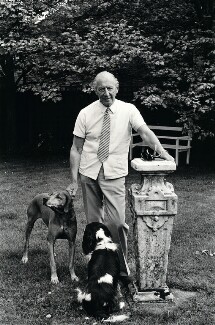Chapman Pincher facts for kids
Quick facts for kids
Chapman Pincher
|
|
|---|---|

Portrait by Jane Bown, 1987
|
|
| Born | Henry Chapman Pincher 29 March 1914 Ambala, Punjab, British India |
| Died | 5 August 2014 (aged 100) Kintbury, Berkshire, England |
| Occupation |
|
| Alma mater | King's College London |
| Subject | Espionage |
| Spouses | 3, including
Constance Sylvia Wolstenholme
(m. 1965) |
| Children | 2; several stepchildren from previous marriages |
Henry Chapman Pincher (born March 29, 1914 – died August 5, 2014) was an English journalist, historian, and writer. He was best known for his books and articles about spies and secret government activities. Before focusing on espionage, he also wrote about science.
Contents
Early Life and Education
Chapman Pincher was born in Ambala, India. His parents were English. His father was a major in the British Army, and his mother was an actress. When he was three years old, his family moved back to England. They settled in Darlington.
Pincher went to 13 different schools as a child. At age 10, he won a scholarship to Darlington Grammar School. He became very interested in genetics there. Later, he studied zoology and biology at King's College London. Chapman Pincher was married three times. His last marriage was to Constance Sylvia Wolstenholme in 1965. He had two children from an earlier marriage.
Starting His Career
Pincher's first job was teaching physics at the Liverpool Institute High School for Boys. He also enjoyed writing for farming magazines. When World War II began, he joined the Royal Armoured Corps. He wanted to serve his country.
During his time in the army, Pincher became a Staff Officer. He learned a lot about weapons and military intelligence. He grew very interested in how information was kept secret. He also wanted to uncover hidden truths. The Daily Express newspaper contacted him. They wanted information about new explosives. Pincher shared details about things like the RDX explosive and the V-1 flying bomb. He also reported on the V-2 rocket and the atom bomb used on Hiroshima.
The Daily Express saw his talent for finding news. After the war, they hired him. Pincher believed it was important to keep the public informed. He enjoyed finding stories that no one else could.
Becoming a Spy Reporter
As a defense reporter for the Daily Express, Pincher developed a unique way of investigating stories. He made friends with important people. This helped him get secret information. He became very interested in spies after covering stories about physicists Alan Nunn May and Klaus Fuchs. These men were found to be Soviet spies after the war.
Pincher's career mainly involved uncovering Cold War secrets in London. He had contacts inside the British Government. These contacts suggested that British spy agencies, MI5 and MI6, might unknowingly be housing Soviet agents. Pincher always went "above and beyond" in his reporting. He would check phone calls and persistently ask important people for answers. He even questioned Prime Minister Harold Wilson.
Pincher often reported exclusive stories that other journalists missed. This earned him the nickname "the lone wolf of Fleet Street." He made both friends and enemies in high places. In 1959, Prime Minister Harold Macmillan even asked if anything could be done to stop him. Pincher earned the title "spy catcher." He exposed several people as spies. One was George Blake, an MI6 member. Blake had helped many Soviet spies get jobs in London.
Pincher won awards for his work. He was named Journalist of the Year in 1964. He also became Reporter of the Decade in 1966.
Later Life and Books
Chapman Pincher is widely known for his book Their Trade is Treachery (1981). In this book, he shared suspicions that MI5's former leader, Roger Hollis, might have been a spy for the Soviet Union. He also described the internal investigations by MI5 and MI6 into this matter. Pincher was close to Peter Wright. Wright was a retired MI5 officer. Wright believed that Prime Minister Harold Wilson might have been a Soviet agent. Pincher tried to get information from Wright to share publicly.
Wright was Pincher's main source for Their Trade is Treachery. Other sources included MP Jonathan Aitken and Wright's former colleague Arthur S. Martin. Aitken wrote a secret letter to Prime Minister Margaret Thatcher in 1980. This letter outlined suspicions from a former CIA chief about Hollis being a double agent.
In 1986, Pincher became involved in the Spycatcher affair. Peter Wright tried to publish his own book, Spycatcher, in Australia. This seemed to break his promise not to share secret information. The British government tried to stop the book from being published. This led to a long legal battle. The British government lost the case in Australia. Wright was represented by Malcolm Turnbull, who later became Australia's Prime Minister. During the trial, Turnbull showed that a high-ranking British official had not told the truth. Spycatcher was published in the United States in 1987. It became a bestseller. Pincher was investigated by the police but was cleared of any wrongdoing.
Death
Chapman Pincher died on August 5, 2014, in Kintbury, West Berkshire. He was 100 years old. He had suffered a stroke seven weeks before. His family was with him when he passed away. He talked about his time uncovering secrets and how it shaped his career. His son said Pincher's last joke was, "Tell them I'm out of scoops."
Images for kids


